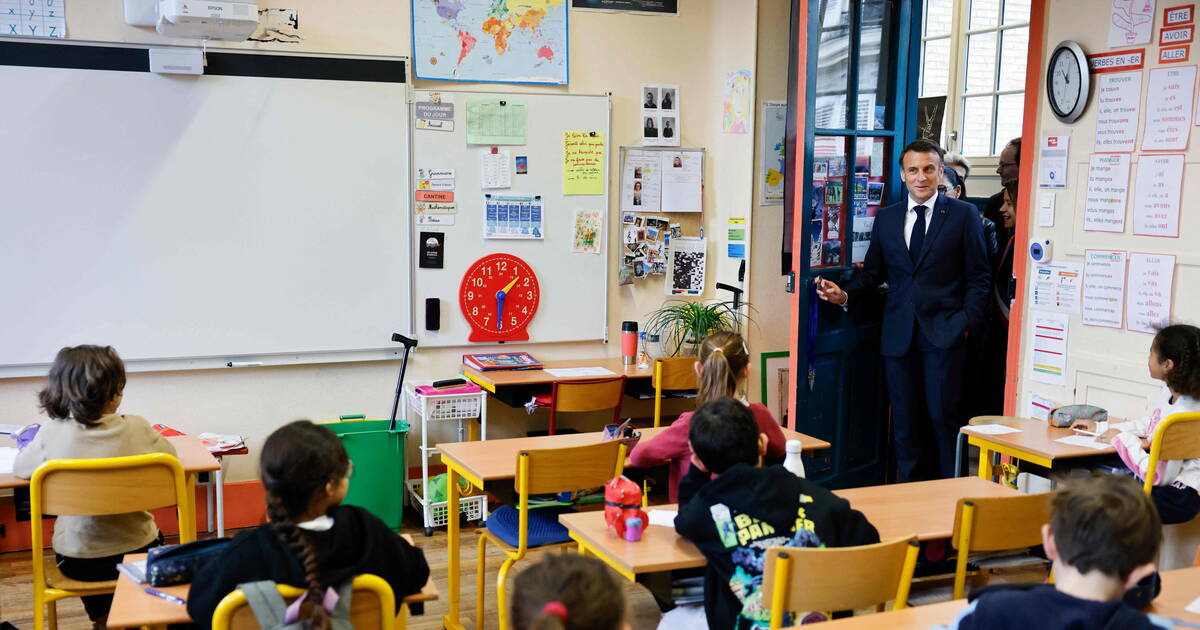The tests will be held “at the end of the license”, i.e. at bac + 3 instead of bac + 5 currently, the head of state said this Friday, April 5, during a trip to the school in Paris.
A new twist in teacher training to try to solve the occupational crisis affecting national education. Emmanuel Macron announced this Friday, April 4, during a trip to a Paris school, the reform from 2025, before increasing the force in the coming years, a competition for the recruitment of future teachers, both primary and secondary. Competition will therefore be upgraded to a bac +3 level, at the end of the license, instead of the current bac +5. Recruits will continue their Master 1 training as civil servant students, with a fee of 1,400 euros net per month. In M2, these will be civil servant trainees paid 1,800 euros net per month. AND “master of professionalization”, represented as“Normal school of the 21st century” by the tenants of Elisha, who took control of the education issue, his “reserved domain”.
The project should enable, according to Emmanuel Macron, “much better training, better preparation (…) and also better recognition of our compatriots who want to engage in this profession”. “We clearly see that the system we adopted in recent decades was undoubtedly not the best. Why ? Because in fact, he made teachers stick to courses that were varied and diverse for five years after graduation.” The executive branch has a threefold goal: “Raising the qualitative level of teacher training, better preparation for performing their profession”, “increase the attractiveness of the profession” AND “respond to the employment crisis”. “We cannot be satisfied with a certain number of unfilled positions,” they say in Elisha.
Demographic wall
The beginning of the September 2023 school year was thus under tension with more than 3,100 unfilled positions in last spring's competitions. Slightly better than the 2022 harvest, which turned into an industrial disaster, with about 4,000 vacancies. The fault lies in a reform dating back to 2021 that requires exams to be taken at the end of the second year of a master's degree, rather than the first, which forced battalions of students to complete an additional year of schooling before starting their studies. 'fireproof. It is therefore an admission of failure on the part of the head of state, who undoes what his ministers (in this case Jean-Michel Blanquer) have put in place.
But the numbers are cruel: during the 2023 competition, 84% of school teaching positions were found. A rate that increased to 78.2% in 2022, but reached 94.9% in 2021. On the Cape side, tenders for teaching in middle and high schools, 82.4% of posts were filled, compared to 77 % in 2022, but 95.5% in 2021. And the prospects for mass retirements in the coming years do not encourage optimism. According to Dares (Directorate for the Promotion of Research, Studies and Statistics), 329,000 teaching positions will need to be filled by 2030, but only 261,000 young people leaving their studies would enter this profession. That's a delta of 68,000 potentially unfilled positions.
For primary school teachers, the executive is banking heavily on the development of a special license, called the LPPE (preparatory license for school teaching), which the Elysée wants “more professional” and more focused on “teaching methods, posture and professional gestures”. Ultimately, 80% of the students admitted to the competition should be from this sector, and 20% from other sectors, according to estimates. On the secondary education side, students will continue to take a disciplinary degree (mathematics, history-geography, etc.) before taking the competitive exam. Guislaine David, spokesperson for Snuipp-FSU, the majority union among elementary school teachers, is not enthusiastic about the president's announcements. First, because he fears that the new LPPE license will narrow the circle of candidates: “I have a lot of doubts about the fact that young graduates definitely want to become professors and start this very specific training.” And to be afraid, too, that by limiting bridges for students from other sectors or people on retraining, we are denying as much as possible “potential candidates”.
But Guislaine David also has a dim view of the contours of the formation, as outlined by Emmanuel Macron: “We have the impression of a desire to take control of national education and weaken the content of training. To become a teacher, you need academic knowledge. However, in this project, teachers are seen as implementers, not as designers. As if it is enough for them to have real manuals and real practice sheets.”
“Many people quit their jobs very quickly”
And facing “structural crisis” recruitment, as described a few months ago in Discharge Pierre Périer, a sociologist and professor of educational sciences at the University of Rennes-II, unions would like the government to activate levers other than employment. “The fee for master's students is a good thing, admits Guislaine David. But more must be done to improve working conditions: attractiveness will depend on being able to do your job without worry.” The same observation by Cécile Suel, National Secretary of SE-Uns: “The reform can have positive effects, provided that teachers gradually enter the profession, with the necessary resources. Because today a lot of people break down and quit their jobs very quickly.”
One last attractive factor: teacher compensation. Emmanuel Macron promised a 10% salary increase, which he did not keep. regrets Cécile Suel. “Efforts have been made for early-career staff, but nothing has been done for those in mid- or late-career, Guislaine David abounds. Obviously, it also slows down vocations when it takes fifteen years to go from 2,000 to 2,400 euros a month.” Emmanuel Macron did not talk about all this on Friday.

